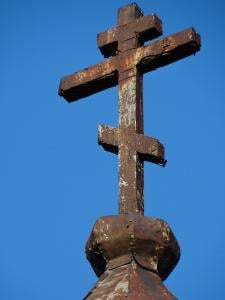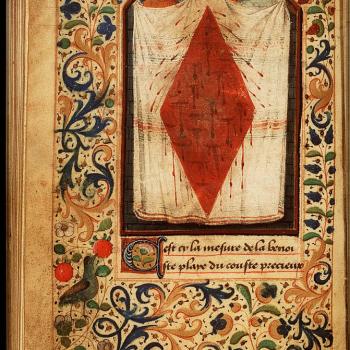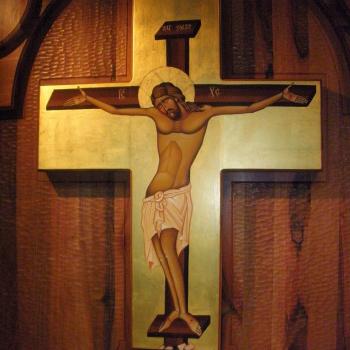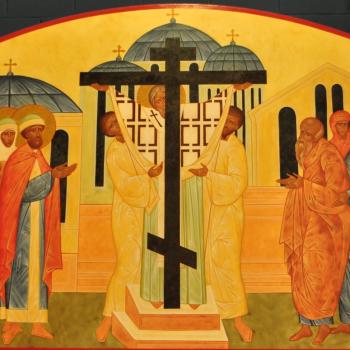
The Christian faith looks to Jesus on the cross, and with it, shows the world the cross as a sign of victory. What a paradoxical sign that is! What was done to Jesus was evil, and it should never have been done. Indeed, the cross was the instrument of that evil, and it was used, not just against Jesus, but countless numbers of people by the Roman Empire. Rome used it as a sign of its power and control, and in that way, as a sign of its victory as it demolished all contenders to its authority. And yet, Christians also view the cross as a sign of victory, not because they promote and support what Rome did, but because they see how God overcame Rome, and with it, the powers that be which manipulated and controlled Rome, by using its own instrument against itself. The cross, a tool of tyranny, became the means of Christ’s ultimate victor against the power of sin itself. The cross, a symbol of death, has been transformed into a symbol of life. Death is conquered by death, evil has revealed its inner, insubstantial nature, and now Christians look to the cross in the light of the vindication of Christ, the vindication revealed by Christ’s resurrection from the dead and ascension into heaven.
The glory of God has been released to the world through the life, death, resurrection and ascension of Christ. God the Word, the God-man Jesus, allowed himself to be taken in by the powers that be; he let them do all they wanted to do to him because he knew what they could do was limited, that it would come to an end. In this way he revealed the limits of evil, that it cannot last forever. His acceptance of the cross was a part of his kenosis (self-emptying) which began in the incarnation. Now, thanks to that kenosis, the glory of God has been shared with the world, allowing us to partake of his vindication. To do so, we must, in our own way, join ourselves to Christ and accept the way of the cross for ourselves. We must die to the self so that we can live. We must follow Jesus into the death of the self, of the false self we have constructed and imposed upon ourselves in light of our actions, including our sins, so that we can be freed from the constraints that false self imposes on us; then, in return, the life which we were meant to have can be ours for eternity.
We are called to place our trust in Jesus. We must engage and do what he told us to do, even when it appears to be foolish and goes against “common sense.” We must reject the way sin influences us and encourages us to think about and act in the world. We must live out our faith, doing what is good and true, even when it is difficult, especially when it is difficult, for that is how we find ourselves following Christ on the path of the cross. We must do more than memorize doctrines, and the explanations for those doctrines, we must live them out as followers of Christ. We must put to death, that is end, all our inordinate attachments, all our false ideologies, including, and especially those which have come to us as a result of pride and despair. We must not think too highly of ourselves, thinking we are greater than we are, even as we must not think so poorly of ourselves we believe there is no good in us and all that we deserve is annihilation. We must cast aside both errors, and all that flows from them, so that we can let ourselves be re-formed and brought back to life in Christ. To many, this level of trust, this willingness to embrace the cross, is foolishness, but for the Christian, it is a sign of trust. We show our belief that beyond our cross, we will find our true self. Thus, while, as Paul said, there are many reasons why someone might reject the cross and what it signifies, we willingly go all in, following it as a sign of victory in a world which holds it is a sign of defeat:
For the word of the cross is folly to those who are perishing, but to us who are being saved it is the power of God. For it is written, “I will destroy the wisdom of the wise, and the cleverness of the clever I will thwart.” Where is the wise man? Where is the scribe? Where is the debater of this age? Has not God made foolish the wisdom of the world? For since, in the wisdom of God, the world did not know God through wisdom, it pleased God through the folly of what we preach to save those who believe. For Jews demand signs and Greeks seek wisdom, but we preach Christ crucified, a stumbling block to Jews and folly to Gentiles, but to those who are called, both Jews and Greeks, Christ the power of God and the wisdom of God (1 Cor. 1:18-24 RSV).
All earthly glory, all the collected wisdom of humanity, all the things connected to pride, are as nothing in comparison to God and God’s glory. The cross, a sign of defeat, has become a sign of victory. We are called to lift it up as a banner representing Christ’s ultimate victory over the powers of sin and the annihilation sin seeks to bring to creation. It reminds us both the work Christ accomplished for the restoration of all things, but also, it serves as a sign of the way we should engage our life in Christ by following the path of the cross for ourselves so that we can open ourselves up and partake of God’s glory for ourselves (in and through our union to Christ).
The further along we go following the way of the cross, no matter how foolish it appears, the more we will find ourselves ready for and receive the grace which God gives us, a grace which will transform us and make us partakers of God’s glory for eternity. We will be able to pray with faith, “Save your people, O Lord, and bless your inheritance. Grant victory to your Church over evil, and protect your people by your cross” (Troparion of the Cross). We should understand that the victory over evil should begin within, that is, within the church and not outside of it; this means the church constantly needs to reforms itself, admitting its errors and sins, so that it can become better and be a better sign of the kingdom of God to the world at large. We must also take the fight within ourselves, fighting the temptations we have, and the sinful habits we have formed throughout our lives, realizing that the cross is indeed the instrument God has set up to help us become victorious in our internal spiritual combat. In this way, the cross can even be said to be a weapon, one which confronts sin, overcoming it from within, not through the way of violence, but through transformation, which is why it can be said to be a “weapon of peace.” It should not be lifted up as a worldly banner, used as a sign to fight against our earthly enemies, but rather, it should be used as a tool which helps us overcome our true foes, which are not flesh and blood; and in this way, we pray:
Christ our God, who were willingly raised upon the cross, grant your mercies to the new people who bear your name. By your power grant joy to the Church. Give her victory over evil with your invincible trophy, the weapon of peace, as an ally (Kontakion of the Cross).
The cross is not like a sword; it is not to be used as an instrument of violence, but rather, as a tool which helps us overcome all violence, finding a way to harmonize ourselves with everyone else, coming together as one. as we all follow the way of the cross where it leads, which is union with each other in Christ.
Stay in touch! Like A Little Bit of Nothing on Facebook.
If you liked what you read, please consider sharing it with your friends and family!
N.B.: While I read comments to moderate them, I rarely respond to them. If I don’t respond to your comment directly, don’t assume I am unthankful for it. I appreciate it. But I want readers to feel free to ask questions, and hopefully, dialogue with each other. I have shared what I wanted to say, though some responses will get a brief reply by me, or, if I find it interesting and something I can engage fully, as the foundation for another post. I have had many posts inspired or improved upon thanks to my readers.













